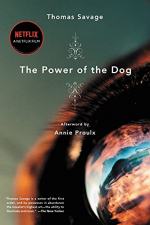|
This section contains 908 words (approx. 3 pages at 400 words per page) |

|
The Power of the Dog Summary & Study Guide Description
The Power of the Dog Summary & Study Guide includes comprehensive information and analysis to help you understand the book. This study guide contains the following sections:
This detailed literature summary also contains Quotes and a Free Quiz on The Power of the Dog by Thomas Savage.
The following paperback edition was used for this study guide: Savage, Thomas. The Power of the Dog. Little Brown, 2001.
It is 1925 in the vast rural outback of southwestern Montana, despite the new century and the encroachments of modern conveniences, very much still the rugged Old West. For 25 years now, two brothers, both in their forties, Phil and George Burbank, have run the family’s cattle ranch, the biggest and most profitable spread in the state. The brothers are radically different in temperament. Phil, intelligent, aloof, handles the day-to-day operations of the ranch while George, more of a dreamer, gentle, something of a plodder, easy going with little ambition, is content to help his brother by managing the books. Phil is menacing, calculating, able to size up others and take advantage of weaknesses—he, years earlier, had maneuvered their parents out of their stake in the ranch and dispatched them to live in a hotel apartment in distant Salt Lake City. Phil enjoys the rough camaraderie of the ranch hands, and their infrequent trips into the nearby town of Beech offers Phil a chance to demonstrate his swagger, picking on unsuspecting city slickers, new arrivals in town, and really any man Phil deigns weak or effeminate, for Phil the words are synonymous. Nearly a year after one particularly brutal showdown with the town’s dipsomaniac doctor, possibly seen and most likely heard by the doctor's young son, the doctor, driven to despair over his inability to provide for his family and the subsequent public humiliation, hanged himself.
Two years later, the delicate balance of the ranch is upended when George decides to marry Rose, the doctor’s widow, although George does not know about Phil and the dead husband. When Rose arrives at the ranch, Phil immediately senses her weaknesses, her vulnerabilities. He dislikes her from the start. She is in his eyes a crass, opportunistic gold-digger. Phil feels the impact of Rose immediately when George insists on having a cartoonishly grand piano delivered to the ranch just for Rose. Phil works to make her feel unwanted and isolated. When George, eager to show off his wife and his new found domesticity, invites the governor himself to a dinner party at the ranch, Phil ruins the evening by refusing even to attend. Phil’s psychological warfare against Rose intensifies. He seldom talks to her and mocks her attempts to furnish the ranch. The treatment causes Rose to collapse into self-medicating with alcohol. Phil senses with animal keenness the depth of Rose’s secret drinking habit, keen to use it against her. Rose, for her part, never quite fits in. She does not understand the workings of the ranch, wears all the wrong clothes, and manages to keep upsetting Phil—she challenges his authority when she invites Native Americans, displaced from the ranch lands by federal fiat, to stay temporarily in camps on the ranch’s vast sprawl, much to Phil’s chagrin. Later, she sells the cast-off cow hides from the ranch’s slaughtering process to an itinerant Jewish peddler despite Phil’s pronounced anti-Semitism.
Peter, Rose’s 16-year-old son, arrives to stay at the ranch for the summer. Peter seems out of place at the ranch. He is introspective, hypersensitive, delicate, bookish, and socially gawky. Something about the boy, however, stirs in Phil memories of a towering cowboy who once worked the ranch, the legendary Bronco Henry, for whom Phil apparently harbored sexual feelings (and perhaps acted on them) but who was killed in an accident that Phil witnesses when he was only 20. The arrival of Peter causes Phil to confront his own sexual identity, long quashed. We suspect what Phil refuses to acknowledge: his hard-edged machismo and emotional distance masks that he is a closeted gay struggling with his sexual identity in the hyper-masculine Wild West world of cowboys and ranchers. When Peter, during a rambling walk around the ranch, happens to catch Phil bathing, nude, in the creek, the two share an awkward moment. Indeed, Phil takes a special interest in Peter, even as his mother begins to fall apart emotionally and psychologically, but the attention he pays to Peter are elements of his own dark scheme to destroy Rose and punish his brother for bringing the woman to the ranch. Phil assumes that Peter is like his father, weak and easy to manipulate. He pretends to take an interest in Peter and offers to teach him skills needed on a ranch.
Peter, as it turns out, is not as weak or as malleable as Phil assumes. He understands what Phil is doing to his mother, so he hatches his own plot. Phil engages Peter in learning how to braid rawhide strips into rope, showing the boy the intricate hand movements necessary to braid thick strands of leather into useable rope. The two share intimate moments of friendship as Peter learns how to braid. Unbeknown to Phil, however, Peter uses the rope braiding sessions to exact his own revenge on Phil, lacing the rope braids with enough arsenic to work its way into Phil’s bloodstream through a deep cut he had in one hand. It is fiendishly clever and calculating. The poisoning works. When Phil weakens and dies in shuddering convulsions, no one, not even his own doctor, suspects poisoning. The ranch belongs now to George and Rose, and, along with Peter, they have the chance of being a happy family.
Read more from the Study Guide
|
This section contains 908 words (approx. 3 pages at 400 words per page) |

|



